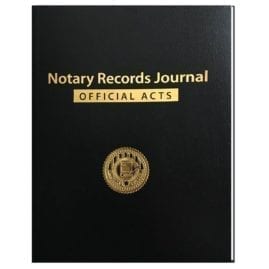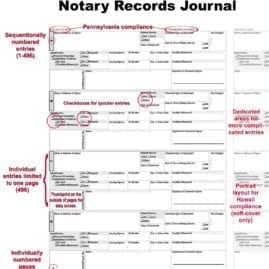Kansas Notary Journals
Does Kansas require a notary journal?
Yes. Kansas requires a notary journal.
Source: Kansas Notary Handbook.
State law requires a notary to maintain a journal of all notarial acts performed by the notary on and after January 1, 2022. A notary shall maintain only one journal at any time in a tangible format but may maintain one or more journals in an electronic format to record all notarial acts performed regarding electronic records. Notary technology providers may provide an electronic journal on the IPEN and RON platforms and may also provide storage of audio-visual recordings of RON sessions. If the journal is maintained on a tangible (paper) format, it shall be a permanent, bound register with numbered pages. If the journal is maintained in an electronic format, it shall be in a permanent, tamper-evident electronic format complying with the rules and regulations of the Secretary of State. A notary must take reasonable steps to ensure that a backup of a journal maintained in an electronic format exists and is secure from unauthorized use. Records must be capable of being printed in a tangible medium when requested.
A notary should record the following information in a journal for each notarial act: 1.) The date and time of the notarial act. 2.) A description of the record, if any, and type of notarial act. 3.) The full name and address of each individual for whom the notarial act is performed. 4.) If identity of the individual is based on personal knowledge, a statement to that effect. 5.) If identity of the individual is based on satisfactory evidence (identification credential or verification on oath or affirmation of a credible witness), a brief description of the method of identification and the identification credential presented, if any, including the date of issuance and expiration of any identification credential; and 6.) The fee, if any, charged by the notary public.
-
Alabama, Alabama Notary Journals, Alaska, Alaska Notary Journals, Arizona, Arizona Notary Journals, Arkansas, Arkansas Notary Journals, California, California Notary Journals, Colorado, Colorado Notary Journals, Connecticut, Connecticut Notary Journals, Delaware, Delaware Notary Journals, District of Columbia, Florida, Florida Notary Journals, Georgia, Georgia Notary Journals, Hawaii, Hawaii Notary Journals, Idaho, Idaho Notary Journals, Illinois, Illinois Notary Journals, Indiana, Indiana Notary Journals, Iowa, Iowa Notary Journals, Kansas, Kansas Notary Journals, Kentucky, Kentucky Notary Journals, Louisiana, Louisiana Notary Journals, LTBB, Maine, Maine Notary Journals, Maryland, Maryland Notary Journals, Massachusetts, Massachusetts Notary Journals, Michigan, Michigan Notary Journals, Minnesota, Minnesota Notary Journals, Mississippi, Mississippi Notary Journals, Missouri, Missouri Notary Journals, Montana, Montana Notary Journals, Nebraska, Nebraska Notary Journals, Nevada, Nevada Notary Journals, New Hampshire, New Hampshire Notary Journals, New Jersey, New Jersey Notary Journals, New Mexico, New Mexico Notary Journals, New York, New York Notary Journals, North Carolina, North Carolina Notary Journals, North Dakota, North Dakota Notary Journals, Notary Journals, Ohio, Ohio Notary Journals, Oklahoma, Oklahoma Notary Journals, Oregon, Oregon Notary Journals, Pennsylvania, Pennsylvania Notary Journals, Rhode Island, Rhode Island Notary Journals, South Carolina, South Carolina Notary Journals, South Dakota, South Dakota Notary Journals, Tennessee, Tennessee Notary Journals, Texas, Texas Notary Journals, Utah, Utah Notary Journals, Vermont, Vermont Notary Journals, Virginia, Virginia Notary Journals, Washington, Washington D.C., Washington Notary Journals, West Virginia, West Virginia Notary Journals, Wisconsin, Wisconsin Notary Journals, Wyoming, Wyoming Notary Journals
Notary Records Journal
$22.95 – $28.95Notary Records Journal Features:
128 heavy weight pages
496 individually numbered entries (1-496)
Durable, high-quality construction
4 entries per page
Entries contained to one page (no page-spanning entries)
Convenient check boxes to speed up entries
Detailed areas…Select options This product has multiple variants. The options may be chosen on the product pageQuick View -
Alabama, Alabama Notary Journals, Alaska, Alaska Notary Journals, Arizona, Arizona Notary Journals, Arkansas, Arkansas Notary Journals, California, California Notary Journals, Colorado, Colorado Notary Journals, Connecticut, Connecticut Notary Journals, Delaware, Delaware Notary Journals, District of Columbia, Florida, Florida Notary Journals, Georgia, Georgia Notary Journals, Hawaii, Hawaii Notary Journals, Idaho, Idaho Notary Journals, Illinois, Illinois Notary Journals, Indiana, Indiana Notary Journals, Iowa, Iowa Notary Journals, Kansas, Kansas Notary Journals, Kentucky, Kentucky Notary Journals, Louisiana, Louisiana Notary Journals, LTBB, Maine, Maine Notary Journals, Maryland, Maryland Notary Journals, Massachusetts, Massachusetts Notary Journals, Michigan, Michigan Notary Journals, Minnesota, Minnesota Notary Journals, Mississippi, Mississippi Notary Journals, Missouri, Missouri Notary Journals, Montana, Montana Notary Journals, Nebraska, Nebraska Notary Journals, Nevada, Nevada Notary Journals, New Hampshire, New Hampshire Notary Journals, New Jersey, New Jersey Notary Journals, New Mexico, New Mexico Notary Journals, New York, New York Notary Journals, North Carolina, North Carolina Notary Journals, North Dakota, North Dakota Notary Journals, Notary Journals, Ohio, Ohio Notary Journals, Oklahoma, Oklahoma Notary Journals, Oregon, Oregon Notary Journals, Pennsylvania, Pennsylvania Notary Journals, Rhode Island, Rhode Island Notary Journals, South Carolina, South Carolina Notary Journals, South Dakota, South Dakota Notary Journals, Tennessee, Tennessee Notary Journals, Texas, Texas Notary Journals, Utah, Utah Notary Journals, Vermont, Vermont Notary Journals, Virginia, Washington, Washington D.C., Washington Notary Journals, West Virginia, West Virginia Notary Journals, Wisconsin, Wisconsin Notary Journals, Wyoming, Wyoming Notary Journals
Modern Journal of Notarial Events
$22.95 – $28.95We designed our Modern Notary journal to serve the professional Notary public. The ideal journal for Notary signing agents, our Modern Notary journal focuses on loan signings and common Notarial…
Select options This product has multiple variants. The options may be chosen on the product pageQuick View -
Alabama, Alabama Notary Journals, Alaska, Alaska Notary Journals, Arizona, Arizona Notary Journals, Arkansas, Arkansas Notary Journals, California, California Notary Journals, Colorado, Colorado Notary Journals, Connecticut, Connecticut Notary Journals, Delaware, Delaware Notary Journals, District of Columbia, Florida, Florida Notary Journals, Georgia, Georgia Notary Journals, Hawaii, Hawaii Notary Journals, Idaho, Idaho Notary Journals, Illinois, Illinois Notary Journals, Indiana, Indiana Notary Journals, Iowa, Iowa Notary Journals, Kansas, Kansas Notary Journals, Kentucky, Kentucky Notary Journals, Louisiana, Louisiana Notary Journals, LTBB, Maine, Maine Notary Journals, Maryland, Maryland Notary Journals, Massachusetts, Massachusetts Notary Journals, Michigan, Michigan Notary Journals, Minnesota, Minnesota Notary Journals, Mississippi, Mississippi Notary Journals, Missouri, Missouri Notary Journals, Montana, Montana Notary Journals, Nebraska, Nebraska Notary Journals, Nevada, Nevada Notary Journals, New Hampshire, New Hampshire Notary Journals, New Jersey, New Jersey Notary Journals, New Mexico, New Mexico Notary Journals, New York, New York Notary Journals, North Carolina, North Carolina Notary Journals, North Dakota, North Dakota Notary Journals, Notary Journals, Ohio, Ohio Notary Journals, Oklahoma, Oklahoma Notary Journals, Oregon, Oregon Notary Journals, Pennsylvania, Pennsylvania Notary Journals, Rhode Island, Rhode Island Notary Journals, South Carolina, South Carolina Notary Journals, South Dakota, South Dakota Notary Journals, Tennessee, Tennessee Notary Journals, Texas, Texas Notary Journals, Utah, Utah Notary Journals, Vermont, Vermont Notary Journals, Virginia, Virginia Notary Journals, Washington, Washington D.C., Washington Notary Journals, West Virginia, West Virginia Notary Journals, Wisconsin, Wisconsin Notary Journals, Wyoming, Wyoming Notary Journals
Classic Journal of Notarial Events
$22.95 – $28.95Classic Notary Journal
Our Classic Journal of Notarial Events is the journal for workplace notaries. Incredibly durable construction, with 128 heavyweight pages, and room for 15 entries per page. Traditional “Ledger” format.
Select options This product has multiple variants. The options may be chosen on the product pageQuick View








